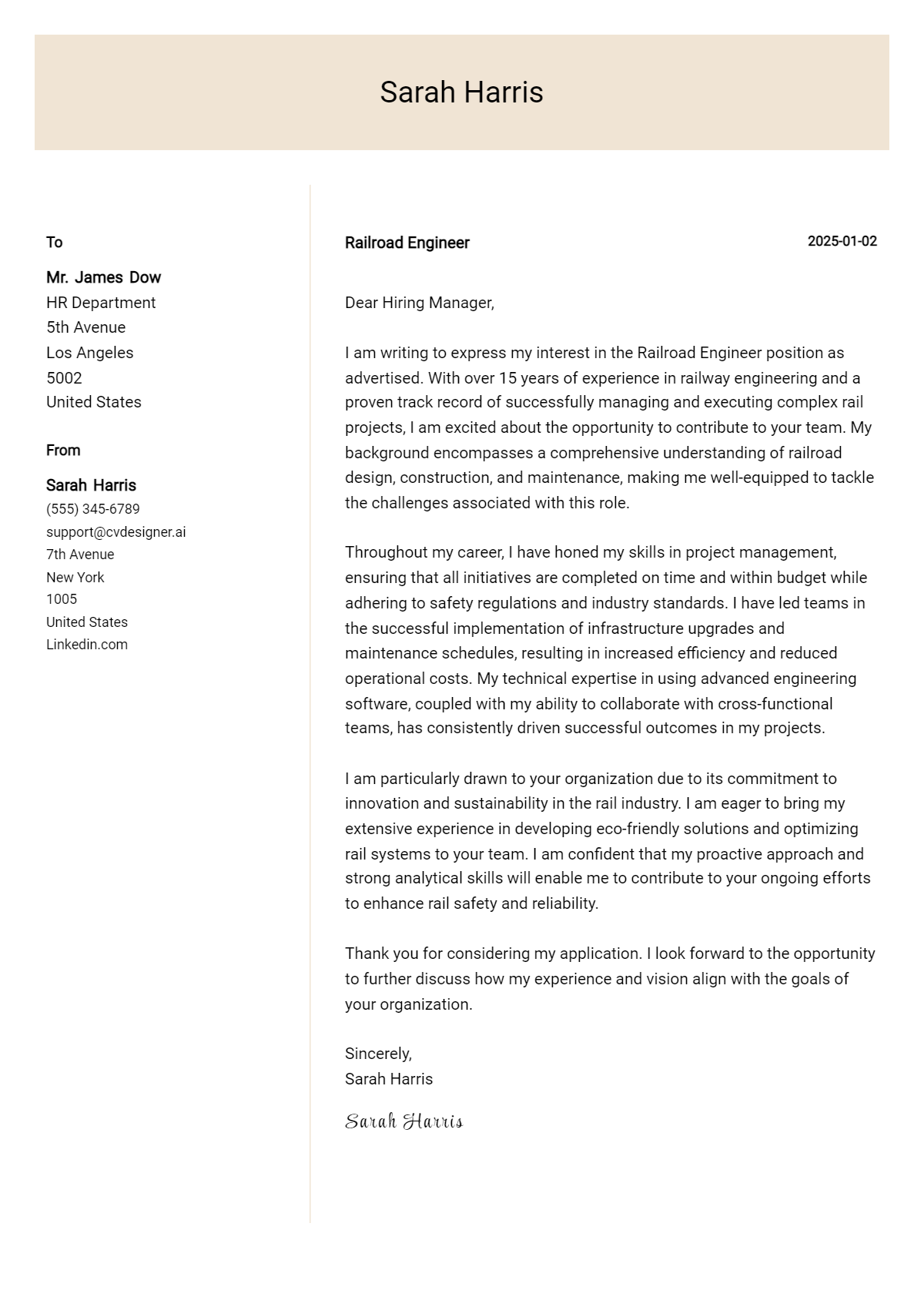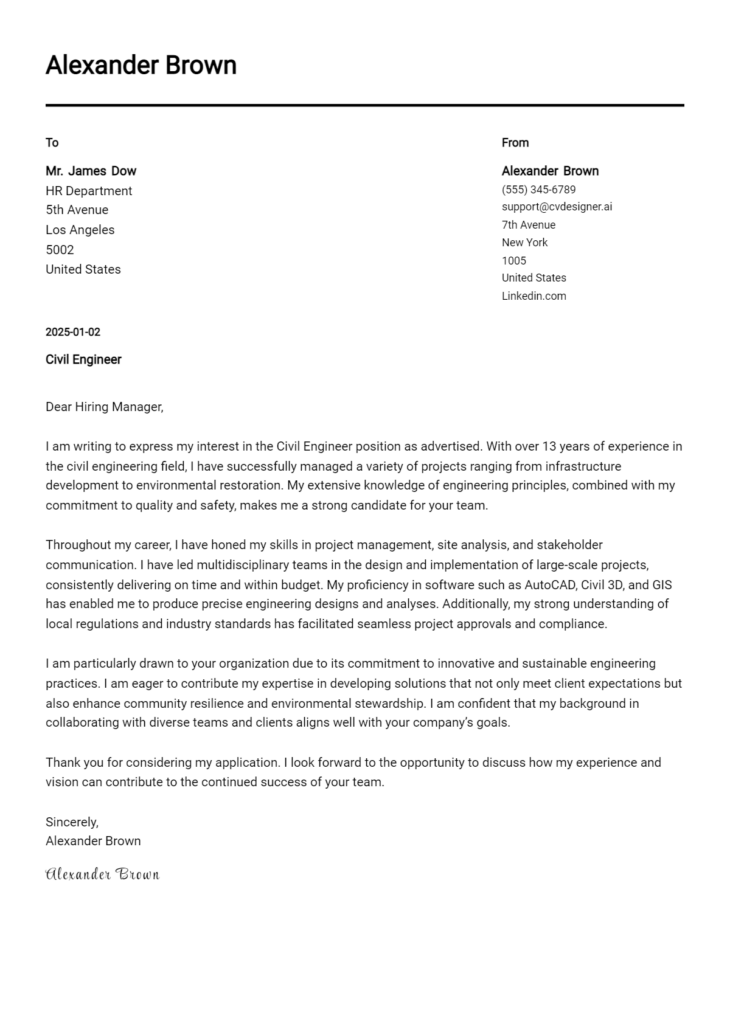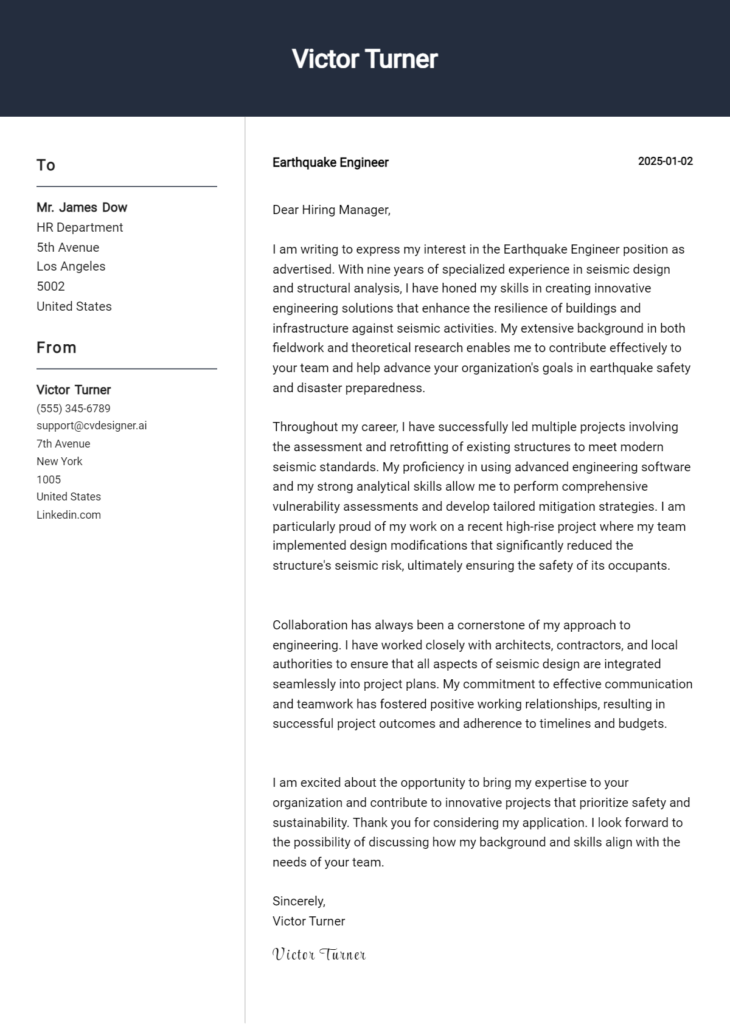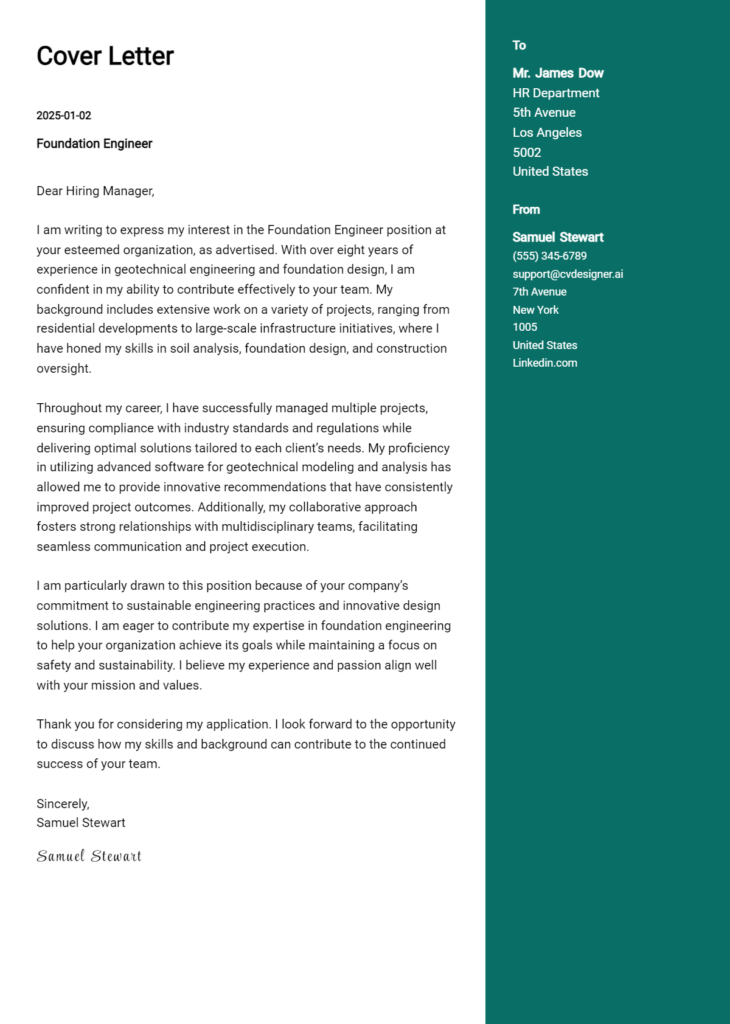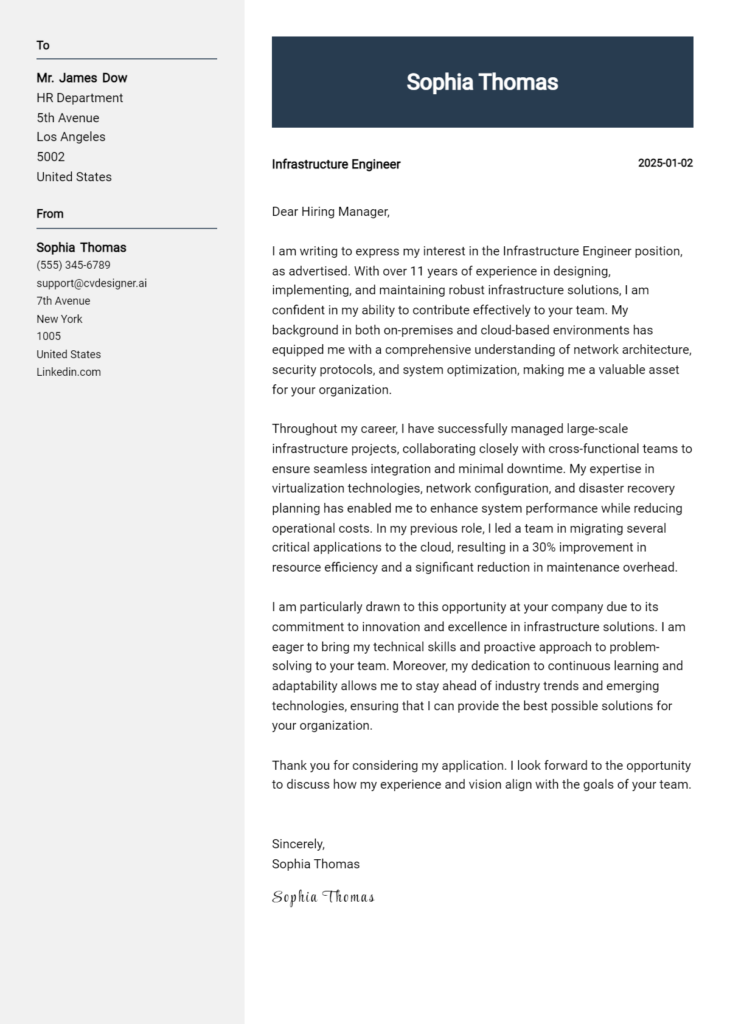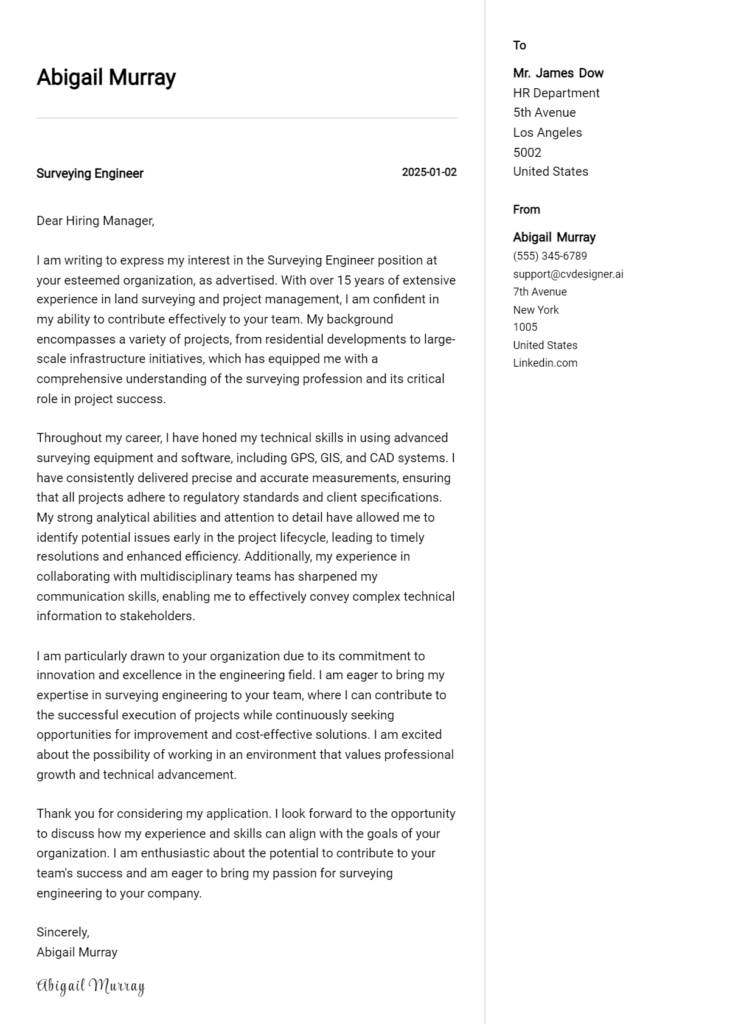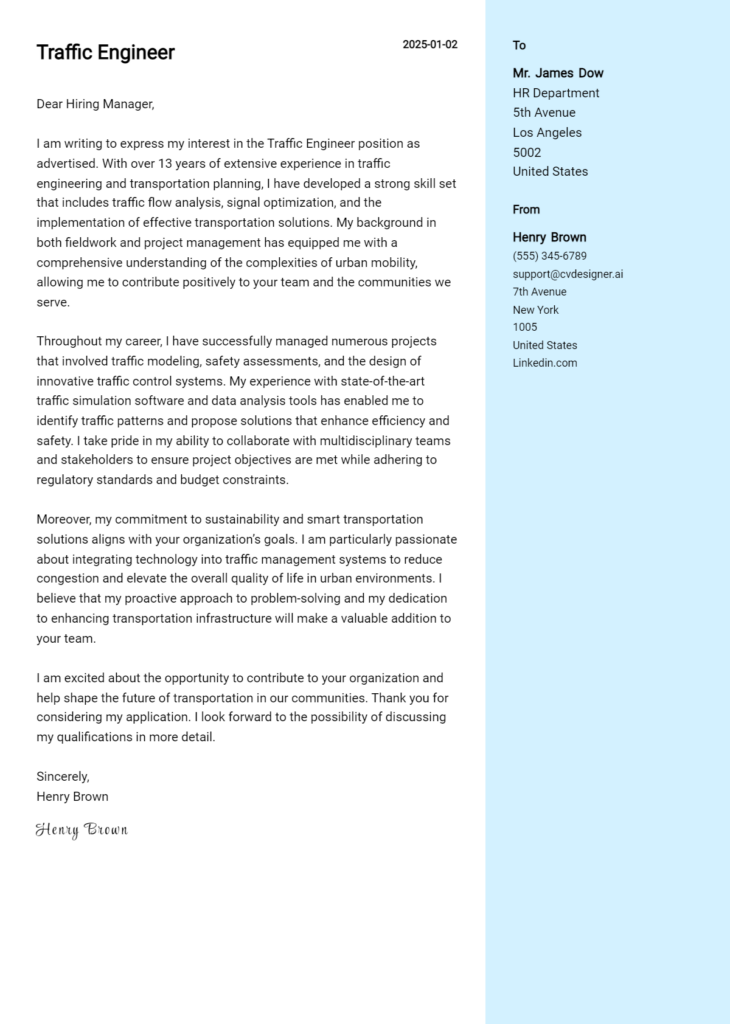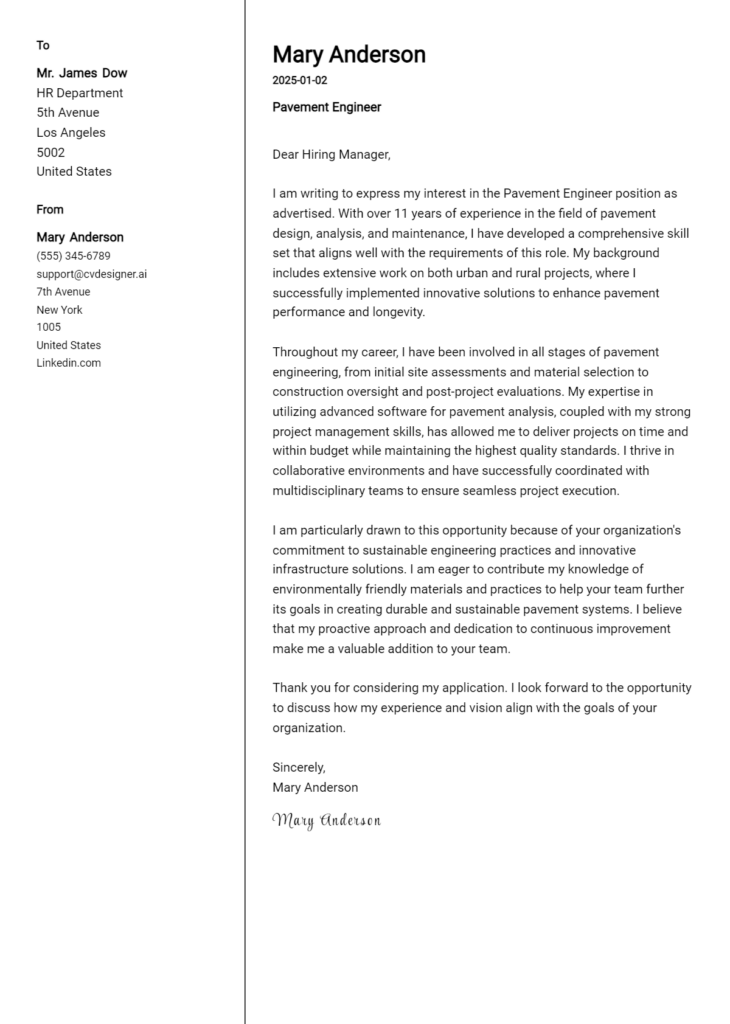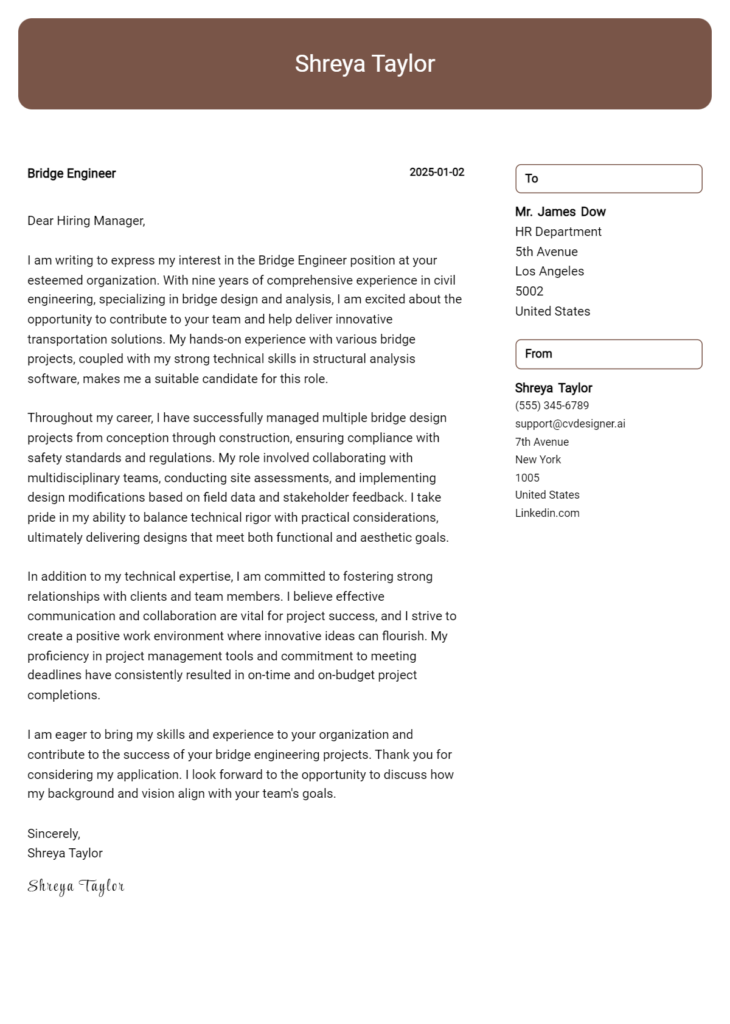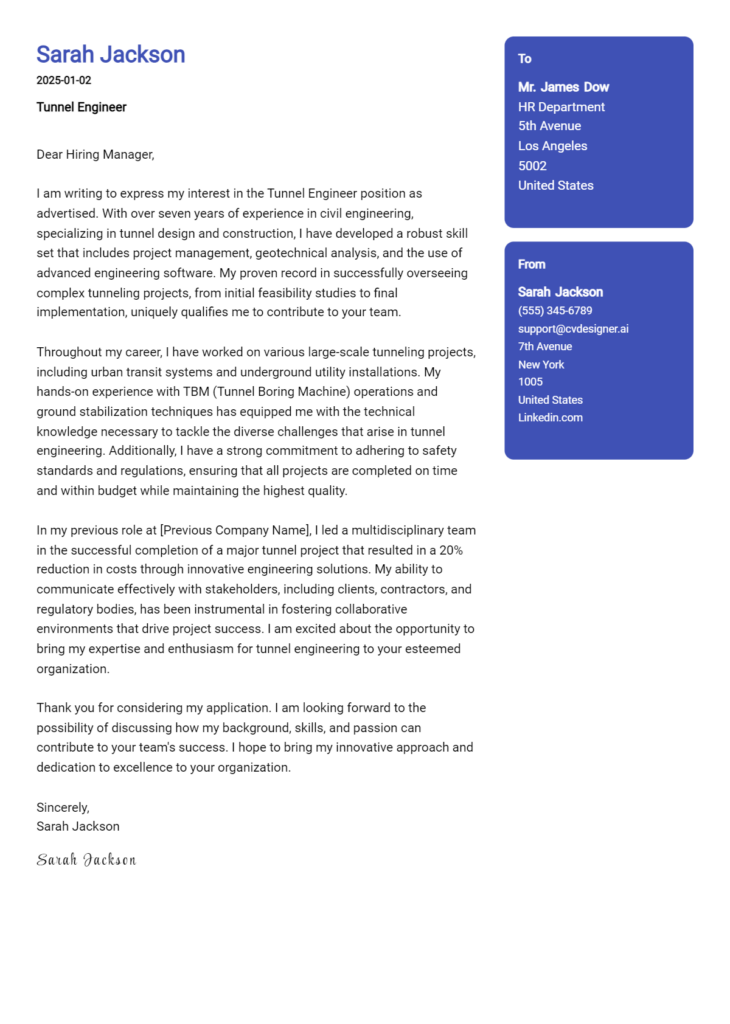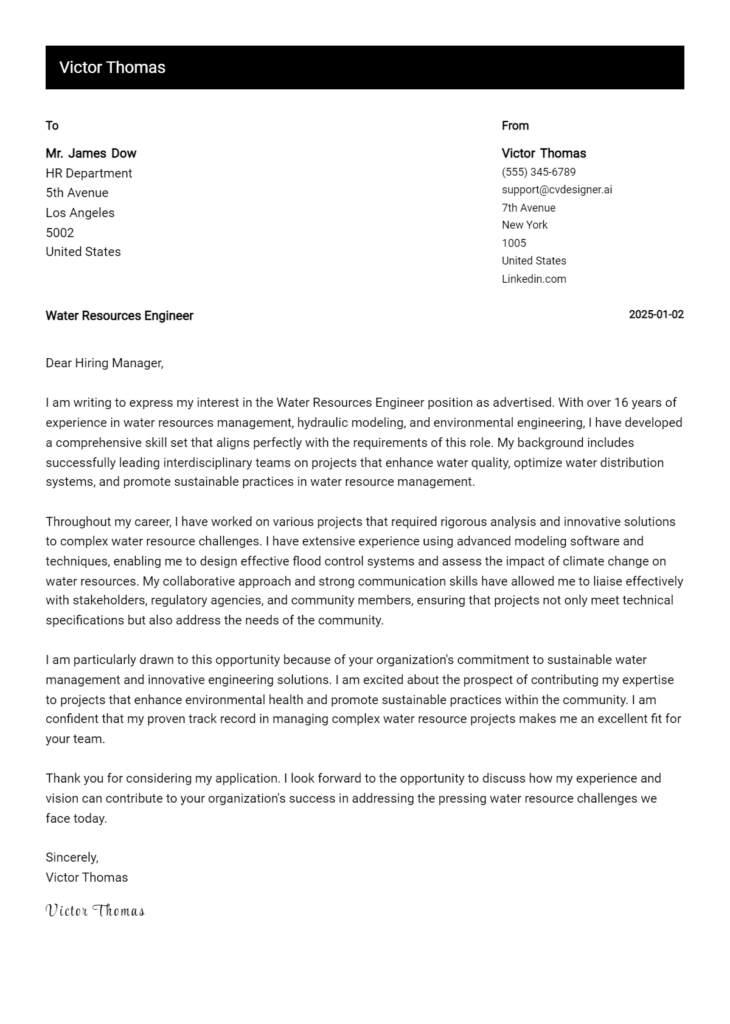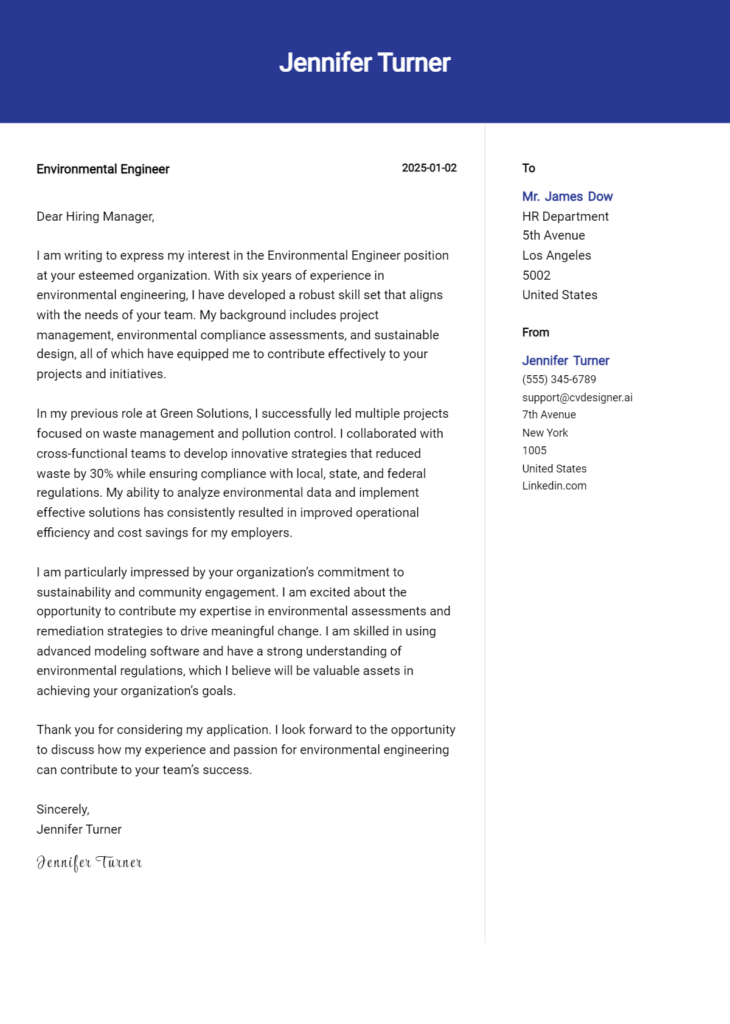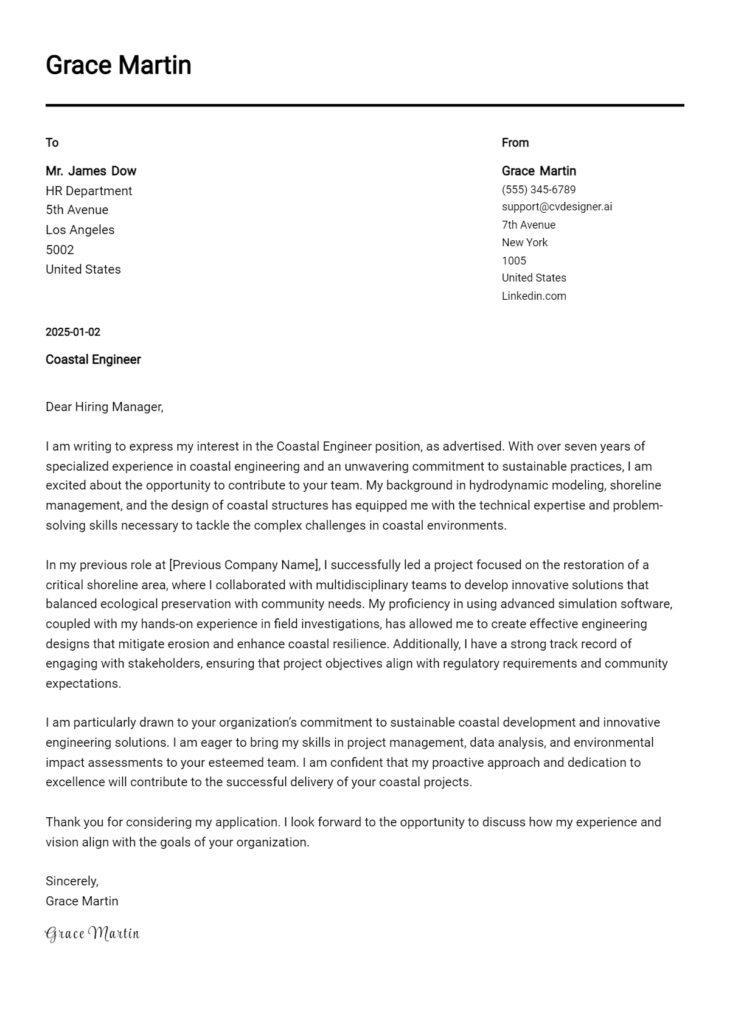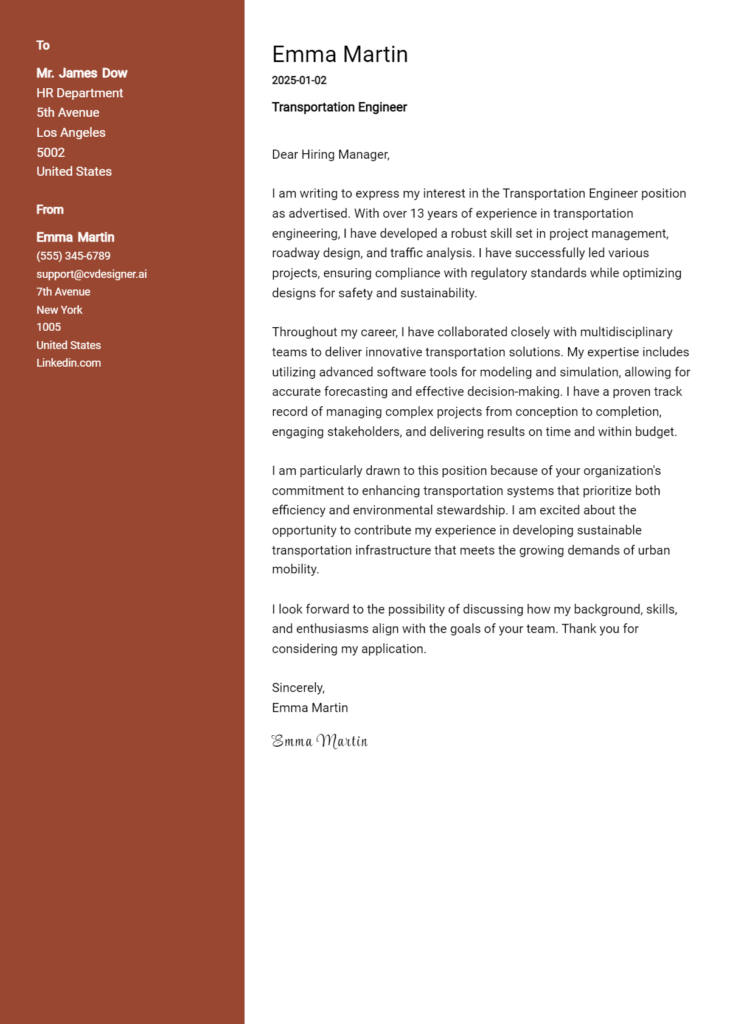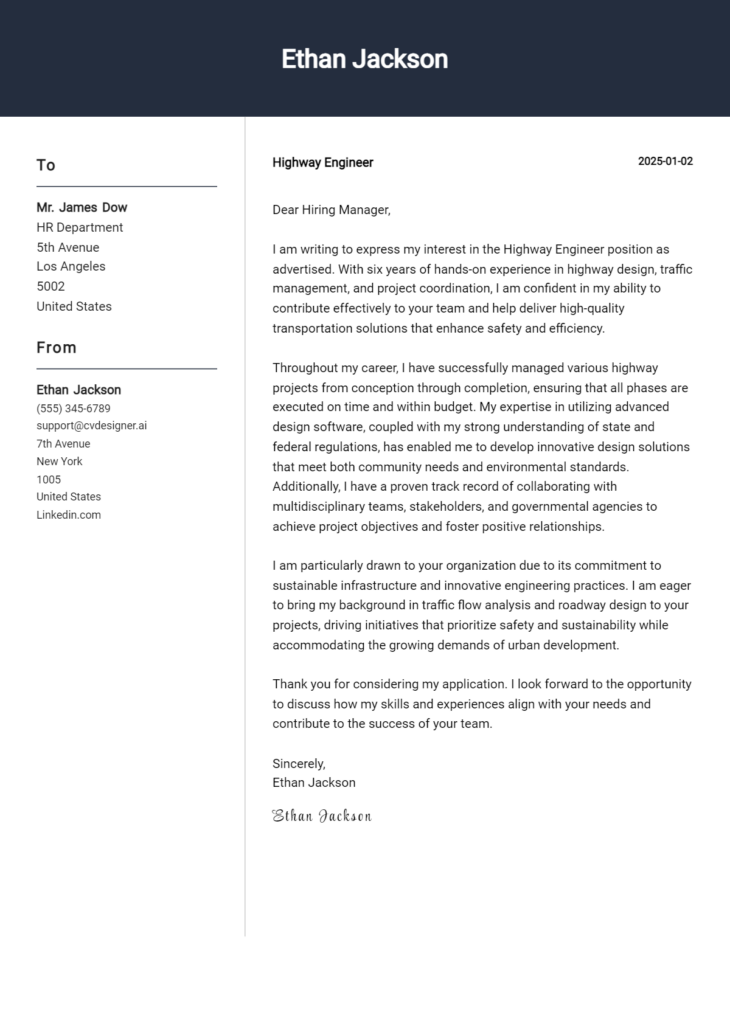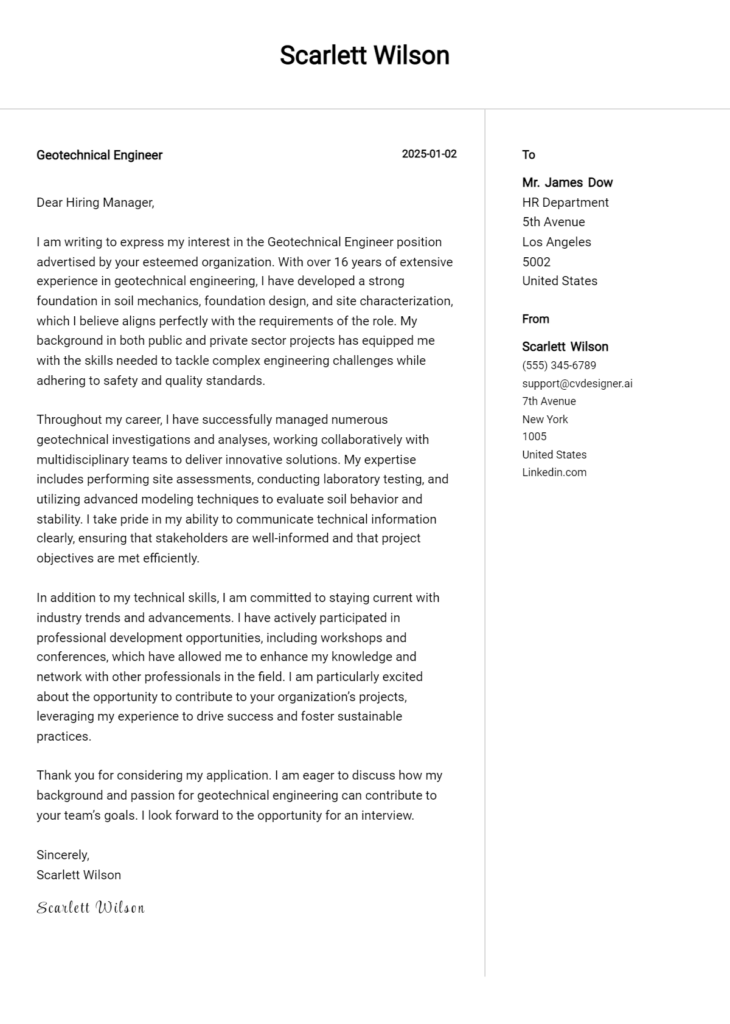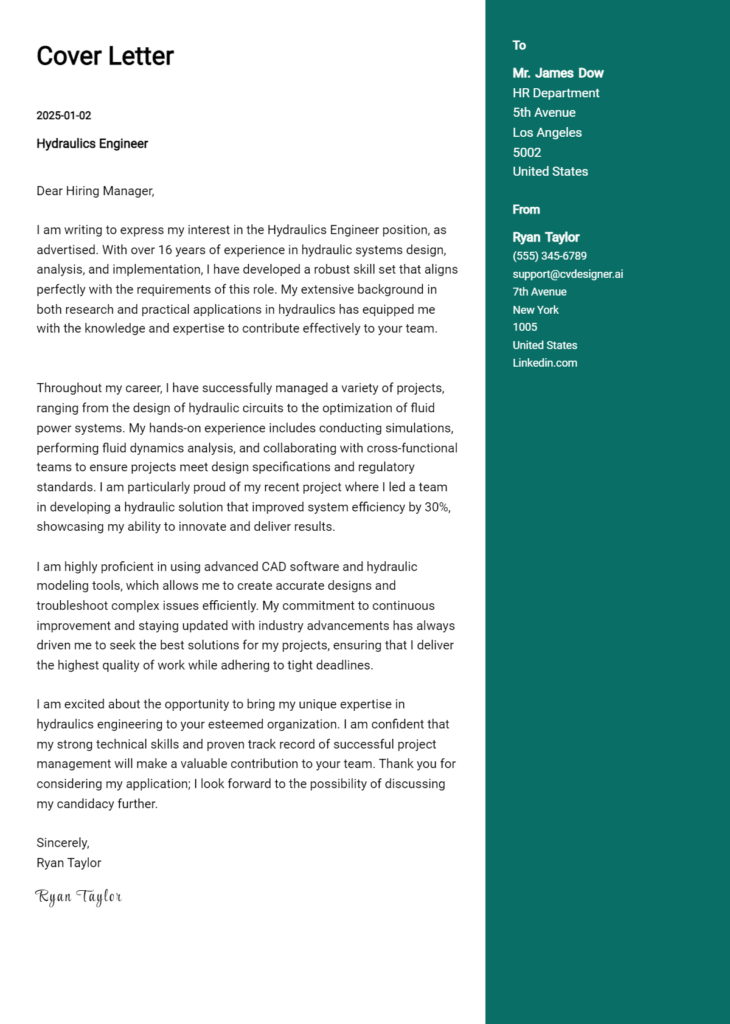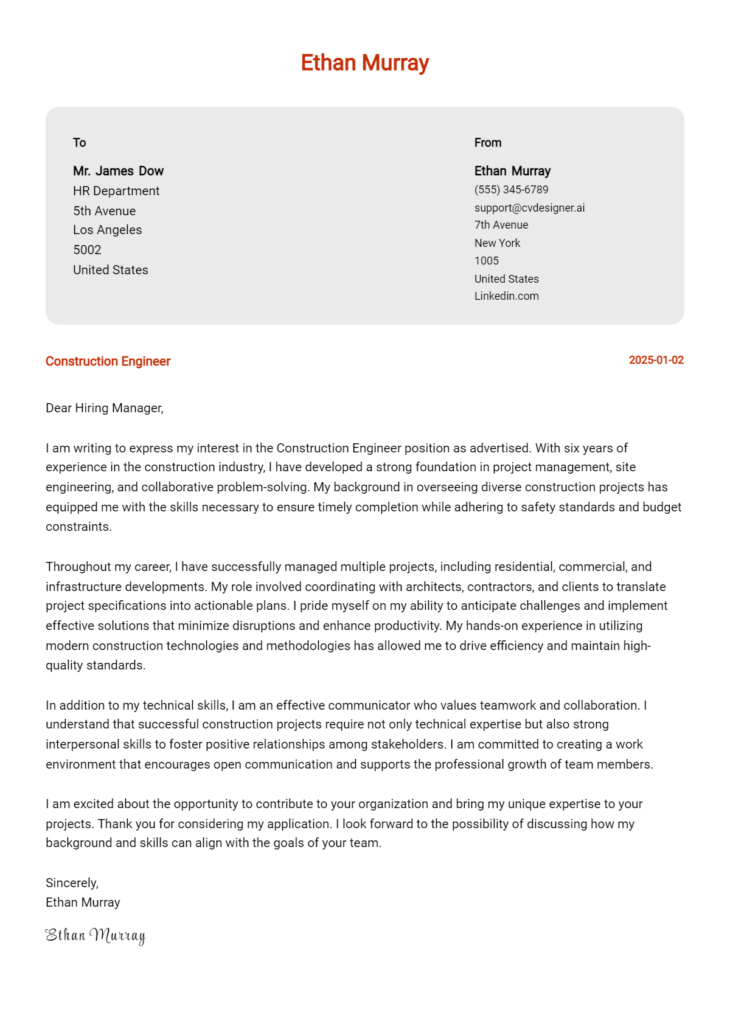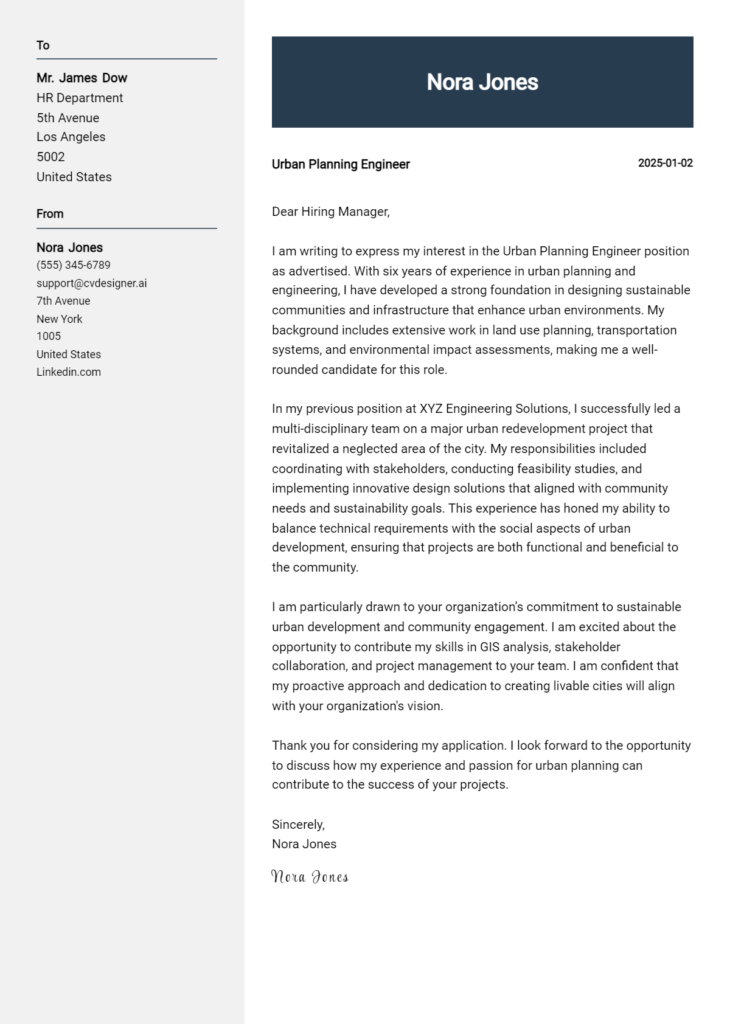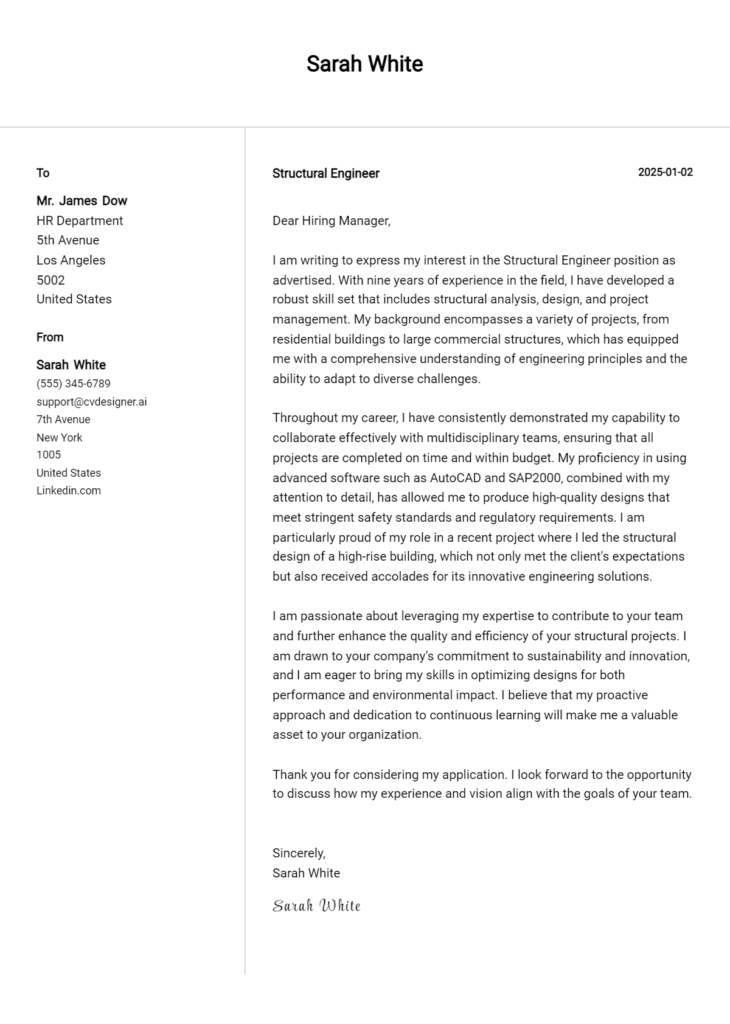Railroad Engineer Cover Letter Examples
Explore additional Railroad Engineer cover letter samples and guides and see what works for your level of experience or role.
How to Format a Railroad Engineer Cover Letter?
Crafting a well-structured cover letter is essential for a Railroad Engineer, as it not only showcases your technical skills but also reflects your ability to communicate effectively and adhere to safety protocols. The presentation of your cover letter can significantly impact the hiring manager's perception of your professionalism and attention to detail—qualities that are paramount in the railroad industry.
In this guide, we will outline the key components of a standout cover letter, ensuring that you effectively convey your qualifications and enthusiasm for the role.
We'll focus on the essential elements of a professional cover letter, including:
- Cover Letter Header
- Cover Letter Greeting
- Cover Letter Introduction
- Cover Letter Body
- Cover Letter Closing
Each section serves a vital purpose in illustrating your expertise and commitment to the field. Let’s delve into each part and explore how to make your Railroad Engineer cover letter truly remarkable.
Importance of the Cover Letter Header for a Railroad Engineer
The cover letter header is a critical component of your job application as a Railroad Engineer. It sets the tone for the rest of the letter and provides essential information that allows the recipient to identify you quickly. A well-structured header should include your contact information, the date, and the recipient's details, ensuring clarity and professionalism. This first impression can greatly influence how your application is perceived, so attention to detail is paramount. A strong header communicates that you are organized and serious about the position, while a weak header can detract from your qualifications.
Strong Example
John Doe 123 Railroad Way Cityville, ST 12345 (123) 456-7890 john.doe@email.com October 1, 2023 Mr. Smith Johnson Hiring Manager Railroad Company Name 456 Train Track Ave Cityville, ST 54321
Weak Example
john doe cityville 555-555-5555 10/01/23 hiring manager
The Importance of a Cover Letter Greeting for a Railroad Engineer
The greeting of a cover letter serves as the initial handshake between the applicant and the hiring manager, setting the tone for the rest of the correspondence. A well-crafted greeting demonstrates professionalism and personalization, establishing a direct connection with the reader. Addressing the hiring manager by name not only shows respect but also indicates that you have taken the time to research and understand the company’s structure. Avoiding generic greetings is crucial, as they can make your application feel impersonal and less engaging. To find the recipient's name, consider checking the company’s website, LinkedIn, or even calling the company to inquire.
Here are examples of strong and weak greetings to illustrate the impact of personalization in your cover letter:
Strong Example
Dear Mr. Johnson,
Weak Example
To Whom It May Concern,
The Importance of a Well-Crafted Cover Letter Introduction for a Railroad Engineer
A well-crafted cover letter introduction is crucial for a Railroad Engineer as it serves as the first impression to the hiring manager. This opening paragraph should not only capture attention but also convey genuine interest in the position. It’s the candidate's opportunity to set the tone for the rest of the letter by briefly showcasing relevant skills, achievements, and experience that align with the job requirements. A strong introduction can differentiate a candidate from others, while a weak one may fail to engage the reader, potentially diminishing the chances of landing an interview.
Strong Example
Dear [Hiring Manager's Name], As a dedicated Railroad Engineer with over five years of experience in designing and implementing efficient rail systems, I am excited to apply for the Railroad Engineer position at [Company Name]. My successful track record in enhancing rail safety protocols and optimizing train schedules has not only improved operational efficiency but has also significantly reduced delays, ensuring reliability for thousands of passengers daily. I am particularly drawn to this role because of [Company Name]'s commitment to innovation and sustainability in the rail industry.
Weak Example
To Whom It May Concern, I am writing to apply for the Railroad Engineer job. I have worked in the field for a few years, and I think I would be a good fit. I have done some projects, and I like trains.
Cover Letter Body for Railroad Engineer
The body of a cover letter for a Railroad Engineer serves as a crucial platform for candidates to highlight their technical skills, relevant experiences, and the unique value they bring to the company. This section should effectively communicate the candidate's accomplishments in previous roles, such as overseeing key rail infrastructure projects, implementing safety protocols, or optimizing train operations. By detailing specific projects and quantifiable results, the applicant can demonstrate their ability to contribute positively to the organization. This not only showcases their qualifications but also reflects their passion for the railroad industry and commitment to advancing its standards.
Strong Example
Dear [Hiring Manager's Name], I am writing to express my interest in the Railroad Engineer position at [Company Name] as advertised. With over seven years of experience in the railroad industry, I have successfully led pivotal projects such as the modernization of the high-speed rail system in [Location], which resulted in a 20% increase in operational efficiency and a significant reduction in maintenance costs. My role involved coordinating with cross-functional teams to implement advanced signaling technologies, ensuring compliance with safety regulations, and training staff on new systems. I am particularly proud of my contribution to the project that won the [Industry Award], showcasing my ability to deliver results while enhancing safety and performance. I am eager to bring my expertise in rail engineering and project management to [Company Name] to help further its commitment to excellence in rail transport. Sincerely, [Your Name]
Weak Example
Dear [Hiring Manager's Name], I am applying for the Railroad Engineer position at [Company Name]. I have worked in the railroad industry for a few years and have been involved in various projects. I believe I can be a good fit. In my previous job, I worked on some rail systems and made some improvements. I think I can help your company because I know how to work with trains. Best, [Your Name]
Importance of the Cover Letter Closing for a Railroad Engineer
The closing paragraph of a cover letter is crucial as it provides a final opportunity to summarize qualifications and express enthusiasm for the Railroad Engineer position. This section should effectively reinforce the candidate's interest in the role while encouraging the hiring manager to take the next steps, such as reviewing the resume or scheduling an interview. A strong closing leaves a lasting impression, while a weak one may diminish the overall impact of the cover letter.
Strong Example
Thank you for considering my application for the Railroad Engineer position at [Company Name]. With my extensive background in railway design and safety protocols, combined with my passion for innovative transportation solutions, I am excited about the opportunity to contribute to your team. I look forward to the possibility of discussing how my skills align with your needs in more detail. Please feel free to contact me to schedule an interview at your earliest convenience.
Weak Example
I hope you like my resume. I think I would be a good Railroad Engineer. Let me know if you want to talk more about it.
These tips will assist candidates in crafting an effective cover letter for a Railroad Engineer position. An impactful cover letter is crucial as it serves as your first impression to potential employers, highlighting technical skills, problem-solving abilities, knowledge of the Software Development Life Cycle (SDLC), teamwork, and a passion for continuous learning. By focusing on these areas, you can demonstrate your qualifications and enthusiasm for the role.
Cover Letter Writing Tips for Railroad Engineer
Showcase Your Technical Skills: Highlight your specific technical skills related to railroad engineering, such as knowledge of signaling systems, track design, and safety protocols. Mention any relevant software or tools you are proficient in, as well as your ability to utilize engineering principles in real-world applications. Tailor this section to match the job description, showing that you possess the exact skills the employer is seeking.
Emphasize Problem-Solving Abilities: Railroad engineers often face complex challenges that require innovative solutions. Provide examples of past experiences where you successfully identified problems and implemented effective solutions. This could include optimizing train schedules, enhancing safety measures, or improving infrastructure reliability. Quantify your achievements to demonstrate the tangible impact of your problem-solving skills.
Demonstrate Your Knowledge of the SDLC: If you have experience with software development processes, discuss your familiarity with the Software Development Life Cycle (SDLC). Explain how your understanding of this framework can be beneficial in railroad engineering projects, such as in developing maintenance management systems or scheduling software. This knowledge showcases your versatility and readiness to contribute to multidisciplinary projects.
Highlight Teamwork and Collaboration: Collaboration is essential in railroad engineering, where projects often involve diverse teams. Share examples of how you have effectively worked with colleagues, stakeholders, and contractors to achieve common goals. Emphasize your communication skills and ability to foster a cooperative work environment, which are critical for successful project execution.
Convey Your Passion for Continuous Learning: The field of railroad engineering is constantly evolving, with new technologies and methodologies emerging regularly. Express your commitment to continuous learning by mentioning any relevant certifications, workshops, or courses you have completed. Discuss how you stay updated with industry trends and your enthusiasm for applying new knowledge to enhance your engineering practices.
By following these tips, you can create a compelling cover letter that captures your qualifications and passion for the Railroad Engineer role. For further assistance, explore our cover letter templates or use our cover letter builder to streamline your writing process.
Common Mistakes to Avoid in a Railroad Engineer Cover Letter
Crafting an effective cover letter is essential for standing out in the competitive field of railroad engineering. Avoiding common mistakes can significantly enhance your chances of making a positive impression. Here are some pitfalls to watch out for:
- Generic Greetings: Avoid using impersonal greetings like "To Whom It May Concern." Instead, research the hiring manager's name for a personalized touch.
- Lack of Specificity: Failing to mention specific projects or experiences related to railroad engineering makes your letter forgettable. Highlight relevant skills and achievements.
- Overly Long Length: A cover letter should be concise and to the point. Aim for one page and focus on key qualifications. For tips on cover letter format, refer to our guide.
- Neglecting Company Research: Not showcasing knowledge about the company and its projects can signal a lack of genuine interest. Tailor your letter to reflect your understanding of their mission and values.
- Typos and Errors: Spelling mistakes and grammatical errors can undermine your professionalism. Always proofread your letter or use tools to ensure clarity and correctness.
- Using Clichés: Avoid vague phrases like "hardworking" or "team player." Instead, provide concrete examples that demonstrate these traits.
- Failure to Include a Call to Action: Concluding without a clear call to action, such as expressing enthusiasm for an interview, can leave a weak impression.
By steering clear of these common mistakes and focusing on creating a compelling narrative about your qualifications, you can increase your chances of landing an interview. For inspiration, check out some cover letter examples to see how others have successfully communicated their skills!
Cover Letter FAQs for Railroad Engineer
What should I include in my cover letter as a Railroad Engineer?
In your cover letter, focus on highlighting your technical skills, relevant experience, and specific projects that showcase your expertise in railroad engineering. Mention your proficiency in design software, knowledge of safety regulations, and experience with project management. It's also beneficial to include any certifications, such as Professional Engineer (PE) status or specialized training in rail systems. Tailor your letter to the job description by addressing the employer's needs and demonstrating how your background aligns with their requirements. Finally, express your passion for the industry and your commitment to enhancing rail safety and efficiency.
How do I address my cover letter for a Railroad Engineer position?
When addressing your cover letter, always try to find the name of the hiring manager or recruiter. Use a formal greeting such as "Dear [Hiring Manager’s Name]" if you can locate it. If the name is unavailable, addressing it to "Dear Hiring Committee" or "Dear [Company Name] Team" is acceptable. Avoid generic salutations like "To Whom It May Concern," as they can come off as impersonal. Personalizing your greeting demonstrates initiative and interest in the position, making a positive first impression on the reader.
How can I make my cover letter stand out as a Railroad Engineer?
To make your cover letter stand out, focus on telling a compelling story about your career in railroad engineering. Start with a strong opening statement that captures attention. Use specific examples to illustrate your accomplishments and contributions to previous projects, such as successfully completing a significant rail line upgrade or implementing innovative safety measures. Additionally, mention any awards or recognitions you received in your field. Highlight your passion for rail systems and your vision for the future of the industry. A well-structured cover letter with a clear narrative will engage the reader and set you apart from other candidates.
Should I include technical skills in my Railroad Engineer cover letter?
Yes, including technical skills in your cover letter is essential for a Railroad Engineer position. Employers are looking for candidates with specific expertise in areas such as track design, signaling systems, and structural analysis. Clearly list relevant skills, such as proficiency in CAD software, knowledge of rail safety standards, and experience with project management tools. However, instead of merely listing these skills, integrate them into your narrative. Provide examples of how you applied these skills effectively in past projects. This approach not only demonstrates your qualifications but also shows how you can contribute to the company's success.
Build your Cover Letter in minutes
Use an AI-powered cover letter builder and have your letter done in 5 minutes. Just select your template and our software will guide you through the process.

